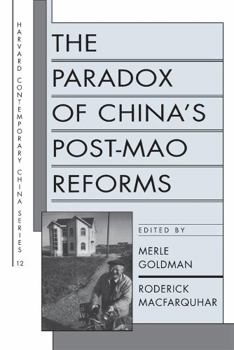The Paradox of China's Post-Mao Reforms
Select Format
Select Condition 
Book Overview
China's bold program of reforms launched in the late 1970s--the move to a market economy and the opening to the outside world--ended the political chaos and economic stagnation of the Cultural Revolution and sparked China's unprecedented economic boom. Yet, while the reforms made possible a rising standard of living for the majority of China's population, they came at the cost of a weakening central government, increasing inequalities, and fragmenting...
Format:Paperback
Language:English
ISBN:0674654544
ISBN13:9780674654549
Release Date:May 1999
Publisher:Harvard University Press
Length:462 Pages
Weight:1.50 lbs.
Dimensions:1.1" x 6.1" x 9.0"
Customer Reviews
2 ratings
Good
Published by Thriftbooks.com User , 15 years ago
I bought The Paradox of Chinas Post-Mao Reforms (Harvard Contemporary China Series). Service and book was in okay quality.
An Excellent Account of China's Development
Published by Thriftbooks.com User , 22 years ago
Mao Zedong had shaped China's political system so that it would be responsive to him. Even though the Cultural Revolution actually pitted portions of the populace against his own bureaucracy, he was always in control of this deliberate class struggle and believed the new culture that would emerge from this struggle would still be under his control. Mao's politics during the Cultural Revolution left China in shambles, later referred to "the ten lost years" in Chinese history. By 1976, it faced lagging agricultural production, an inefficient industrial system, high unemployment, sub par standards of living, widespread apathy and cynicism, backwards technology, and a high rate of population increase.In the late 1970s, China launched a wave of economic reforms to liberalize China's economy and improve the quality of life in China. Such reforms induced an unprecedented wave of economic boom which has extended to today. However, such reforms have also come at the cost of a weakening central government, increasing inequalities, and fragmenting society. In The Paradox of China's Post-Mao Reforms, the essays of various China specialists analyze the impact of China's economic reforms have had on its political system and social structure. The most important point that these specialists jointly raise is that Deng originally conceived his economic reform as a means to enhance the authority of the party-state. However, given the changing dynamics between the state and society, such reforms have ironically undermined the government's authority. Even though the party-state could still repress political dissidents which threatened the party or its leaders, it is increasingly unable to handle other pressing problems such as corruption, the increasing social and geographical disparities, agricultural stagnation, increasing lawlessness, and worsening environmental pollution. The party-state lacks the political institutions and infrastructure to regulate China's accelerating informal federalism, and as current problems grow to be more acute, the party-state will potentially face even greater disorder.






